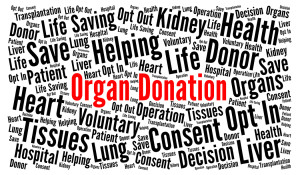 I have two friends that have made me aware of the issue of kidney disease. Carol Nixon actually donated a kidney and wants to let people know that for her, life has only gotten better since donating. On the flip-side of that, Evoia White has been waiting for a kidney on the donor list for five years and is hoping one day soon for a transplant that can free her from the dialysis machine she must use daily. I hope sharing these stories can help others to get help they might not know they need, or maybe, just maybe, I might inspire someone to donate the gift of life to someone else.
I have two friends that have made me aware of the issue of kidney disease. Carol Nixon actually donated a kidney and wants to let people know that for her, life has only gotten better since donating. On the flip-side of that, Evoia White has been waiting for a kidney on the donor list for five years and is hoping one day soon for a transplant that can free her from the dialysis machine she must use daily. I hope sharing these stories can help others to get help they might not know they need, or maybe, just maybe, I might inspire someone to donate the gift of life to someone else.
I am not a doctor, so most of the information I am sharing I found on the National Kidney Foundation’s website (www.kidney.org). I had no idea how important our kidneys are or all that they do. March is National Kidney Month, and the National Kidney Foundation urges all Americans to give their kidneys a second thought and a well-deserved check-up. With the health issues we face as drivers, it might be worth your time to ask your doctor about your kidney health and get a few simple tests done.
One in three Americans are at risk for kidney disease due to diabetes, high blood pressure or a family history of kidney failure. There are more than 30 million Americans who already have kidney disease, and most don’t know it because there are often no symptoms until the disease has progressed. Kidney disease is the 9th leading cause of death in the United States, and there are more than 95,000 people currently on the list waiting for a kidney transplant.
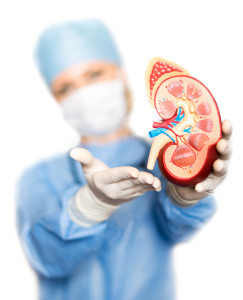 A kidney is about the size of your fist – you have two (one on each side) in your lower back. Their functions include filtering waste out of your blood, regulating the body’s salt, potassium and acid content, balancing the body’s fluids, removing drugs from the body, releasing hormones that regulate blood pressure, producing an active form of vitamin D that promotes strong and healthy bones, and controlling the production of red blood cells.
A kidney is about the size of your fist – you have two (one on each side) in your lower back. Their functions include filtering waste out of your blood, regulating the body’s salt, potassium and acid content, balancing the body’s fluids, removing drugs from the body, releasing hormones that regulate blood pressure, producing an active form of vitamin D that promotes strong and healthy bones, and controlling the production of red blood cells.
Some of the best things you can drink and eat to promote kidney health and help prevent kidney stones are water, cranberries and cranberry juice, apples, mushrooms (excellent source of Vitamin D) and oatmeal (the real stuff), which can be a good source of iron and B6. Cauliflower has lots of Vitamin C, along with foliate and fiber, and contains certain compounds that help your liver neutralize toxic substances.
When my friend Carol Nixon met her co-worker Deb Pollard, they became instant friends. In conversation, Deb told her about how her husband Craig was on dialysis and in need of a kidney transplant. Friends that know her would be quick to tell you that Carol puts others before herself, and it was at the 2015 Women In Trucking conference that Nixon offered to help by donating one of her kidneys. Ever since she was young, Carol has lived by the motto that “nothing is impossible!” She made up her mind that even if she was not a match for Craig, she would still donate her kidney to someone else, if for no other reason than to improve his chances of getting a transplant.
After a series of tests were done, they had to wait three weeks to see if they were a match. When the results came back, they were a match, so they could proceed with the surgery. Carol didn’t have a good feeling about the hospital that the surgery was to take place originally and, since she was donating, it was her choice where the surgery would be. Her feeling was right. Craig had to go through all the tests over again, and this time they found a triple blockage in his heart. Had the transplant occurred without this being corrected first, they would have lost him on the table.
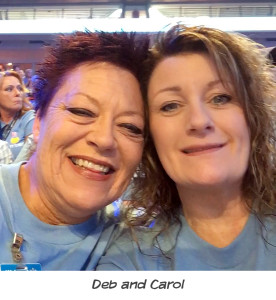 The surgery occurred in November 2016, and, with no complications, was successful. Deb Pollard says thank you is not enough – “she saved my husband’s life!” Deb has her husband because of Carol’s commitment to help a friend in such a big way. Craig is doing great and taking care of himself after getting a second chance at a normal life. He will have to take anti-rejection medicine for the rest of his life, but it is working perfectly. The kidney is functioning and letting him live.
The surgery occurred in November 2016, and, with no complications, was successful. Deb Pollard says thank you is not enough – “she saved my husband’s life!” Deb has her husband because of Carol’s commitment to help a friend in such a big way. Craig is doing great and taking care of himself after getting a second chance at a normal life. He will have to take anti-rejection medicine for the rest of his life, but it is working perfectly. The kidney is functioning and letting him live.
Carol is healthy, and at her last checkup, they told her that she could live to be 122 with her numbers the way they are now. Her one kidney is functioning at 70%. Before the surgery, one kidney was functioning at 49% and the other at 51% – she kept the kidney at 51% and donated the one operating at 49%. Carol wants everyone to know that her choice to donate her kidney has not affected her life and the way she lives it. If anything, it’s made her life better. She takes care of herself and works hard every day to make it the best!
My friend Evoia is living on the other side of a kidney transplant. She was diagnosed with polycystic kidney disease in May 2005. They told her that it was most likely hereditary. When she talked to her mother, her mom told her that she had it too, but she had never talked about it. If you know you have a disease this serious, you must share that fact with your children so they can be tested early to see if they have inherited it from you. Evoia was able to control the progression of the disease with her diet and medicine until 2014, at which point she had to begin dialysis. This treatment is necessary for her to live, but it takes away so much of her freedom.
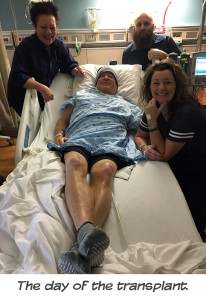 There are two types of dialysis for kidney failure – Peritoneal, where the inside lining of your own belly acts as a natural filter, and Hemodialysis, where your blood is pumped out of your body through an artificial kidney machine and then returned to your body by tubes that connect you to the machine. Evoia opted for the Hemodialysis. Using your veins gives you a better cleanse, and she has the option to do this procedure at home. She can do her dialysis for a few hours each night before she goes to sleep. The other option would have required her to go to a facility and be hooked to a special machine for 4 hours, 3 days a week.
There are two types of dialysis for kidney failure – Peritoneal, where the inside lining of your own belly acts as a natural filter, and Hemodialysis, where your blood is pumped out of your body through an artificial kidney machine and then returned to your body by tubes that connect you to the machine. Evoia opted for the Hemodialysis. Using your veins gives you a better cleanse, and she has the option to do this procedure at home. She can do her dialysis for a few hours each night before she goes to sleep. The other option would have required her to go to a facility and be hooked to a special machine for 4 hours, 3 days a week.
You receive a kidney according to your blood type. Evoia is O positive, which means whoever donates to her must be O positive, as well. She told me that if you are a donor, O positive is universal, meaning you can donate to anyone. If you might be interested in donating, you can contact Evoia directly at dialysisrocks@gmail.com. I hope my friend can find a suitable donor soon.
On the Kidney Foundation website, there is an online at-risk quiz. During the month of March, the National Kidney Foundation is offering free screenings to those who are most at risk. Locations and information can be found on the calendar on their website. For someone who donates and, in the unlikely event something happens to your kidney, you would automatically be put at the top of the donor list, so when a match to you becomes available, you are the first one in line to receive it.
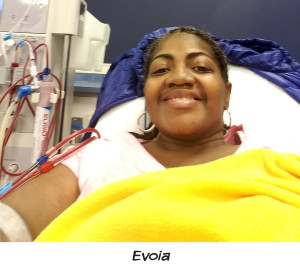 If you are interested in being a living donor, there are no out-of-pocket expenses for you. All the testing is free to you. Evoia told me that she has heard stories of people who wanted to donate, but while going through the necessary tests, they found out they had something wrong – the testing saved their life! Not everyone who wants to donate is able to, for one reason or another, but if it works out that you can, be it to someone you know or a total stranger, it’s giving the gift of life – and what an amazing gift that would be.
If you are interested in being a living donor, there are no out-of-pocket expenses for you. All the testing is free to you. Evoia told me that she has heard stories of people who wanted to donate, but while going through the necessary tests, they found out they had something wrong – the testing saved their life! Not everyone who wants to donate is able to, for one reason or another, but if it works out that you can, be it to someone you know or a total stranger, it’s giving the gift of life – and what an amazing gift that would be.
